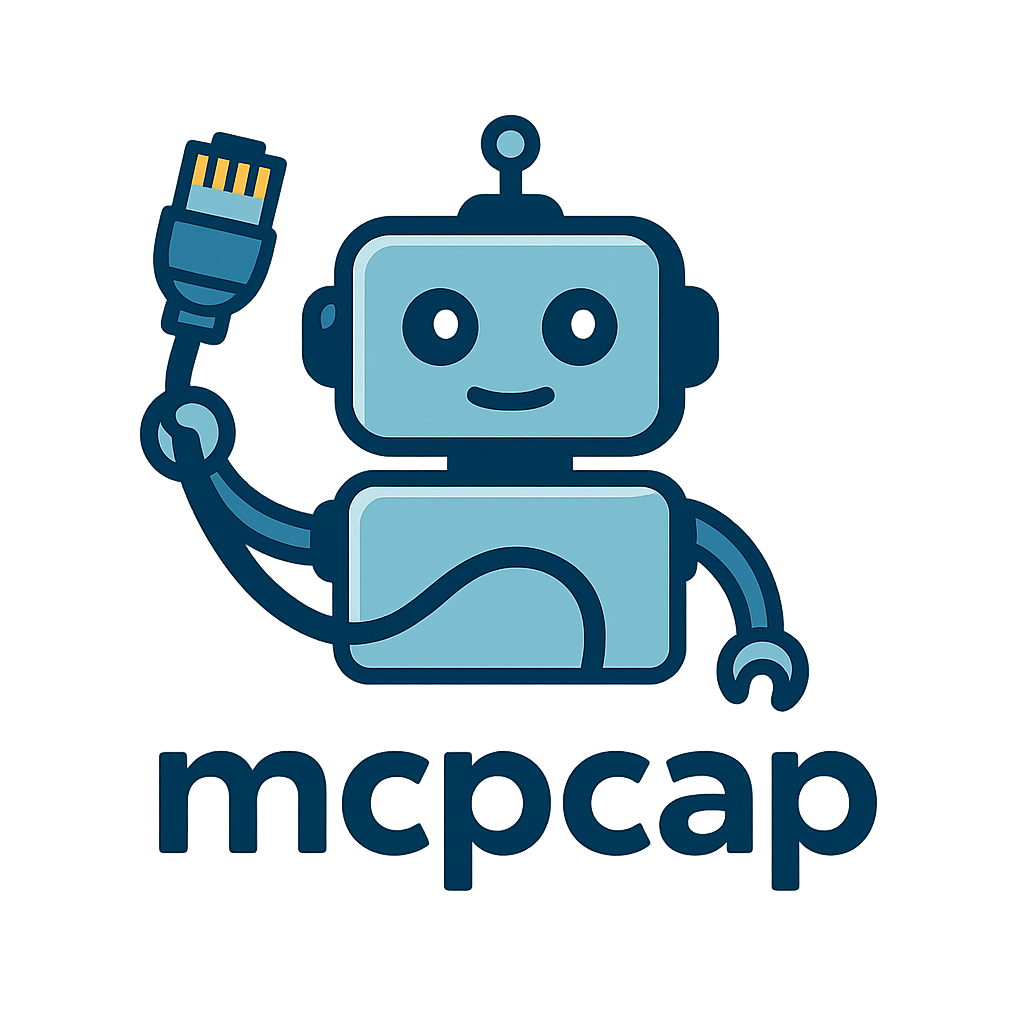About
mcpcap is a stateless Model Context Protocol server that lets LLMs analyze network packet captures via protocol-specific tools (DNS, DHCP, ICMP, CapInfos) using local paths or remote URLs. It supports modular extensions and returns structured JSON for easy integration.
Capabilities

Overview
The mcpcap MCP server is a lightweight, stateless tool that bridges large‑language models (LLMs) with the rich world of network traffic analysis. By exposing protocol‑specific analysis routines over MCP, it allows AI assistants such as Claude to ingest and interpret PCAP files without handling raw binary data. Developers can simply pass a file path or an HTTP URL to the server’s tools, letting mcpcap perform the heavy lifting of packet parsing and return structured JSON that LLMs can readily consume.
Solving a Real‑World Pain Point
Network forensics, security incident response, and performance troubleshooting all rely on PCAPs. Traditionally, analysts must manually run command‑line utilities (tcpdump, Wireshark CLI, or custom scripts) and then translate raw output into actionable insights. mcpcap eliminates this manual loop by offering ready‑made, protocol‑focused analysis functions that produce human‑readable summaries and structured data. This means AI assistants can answer questions like “What DNS queries were made during the capture?” or “Did any DHCP anomalies occur?” without the user needing to know command‑line syntax.
What It Does and Why It Matters
mcpcap’s modular architecture groups analysis tools by protocol—DNS, DHCP, ICMP, and generic capture metadata. Each module exposes a single function that accepts a local path or remote URL to a PCAP file, parses it using Scapy’s robust packet engine, and returns JSON with key metrics. Because the server is stateless, it scales horizontally; multiple AI clients can query it concurrently without contention. For developers building AI‑augmented network tools, this design means they can integrate deep packet analysis into conversational agents or workflow automations with minimal friction.
Key Features Explained
- Stateless MCP Tools – Every request is independent; no session state or file uploads are required, simplifying security and deployment.
- Protocol‑Specific Modules – Dedicated functions for DNS, DHCP, ICMP, and general capture information provide focused, high‑quality insights.
- Local & Remote Support – Accepts both file system paths and HTTP URLs, enabling analysis of on‑prem captures or cloud‑stored logs.
- Scapy Integration – Leverages Scapy’s parsing engine for accurate protocol decoding across a wide range of network layers.
- Structured JSON Output – Consistent, machine‑readable responses that LLMs can parse into explanations or further queries.
- Extensible Design – Adding a new protocol module is straightforward, allowing the server to evolve with emerging networking needs.
Real‑World Use Cases
- Security Incident Response – Quickly surface DNS tunneling or DHCP spoofing indicators from a captured traffic dump.
- Network Performance Analysis – Use ICMP analysis to quantify latency, packet loss, and routing paths in a single query.
- Automated Forensics Workflows – Embed mcpcap calls into an AI‑driven investigation pipeline that pulls capture URLs from a ticketing system and returns actionable summaries.
- Educational Tools – Allow students to query real capture files through an AI tutor that explains protocol behavior without needing Wireshark installed.
Integration with AI Workflows
An MCP client (e.g., Claude Desktop) can declare the mcpcap server in its configuration and invoke tools like or . The LLM receives the JSON response, extracts relevant fields, and can generate natural‑language explanations or further investigative prompts. Because the server is stateless, it can be deployed behind a lightweight container or as part of a larger observability stack, ensuring that AI assistants always have up‑to‑date network insights at their fingertips.
Unique Advantages
- Zero File Uploads – Eliminates the need to transfer potentially large PCAP files over the network, reducing bandwidth and security concerns.
- Protocol‑Focused Insight – Each module delivers depth in its domain, avoiding generic “dump everything” outputs that are hard to interpret.
- Scalable & Lightweight – Built in Python with minimal dependencies, it can run on modest hardware while still handling high‑volume capture analysis.
In summary, mcpcap turns raw packet captures into actionable intelligence that AI assistants can instantly reason about. Its stateless, modular design and comprehensive protocol coverage make it an indispensable tool for developers building AI‑powered network analysis solutions.
Related Servers
MarkItDown MCP Server
Convert documents to Markdown for LLMs quickly and accurately
Context7 MCP
Real‑time, version‑specific code docs for LLMs
Playwright MCP
Browser automation via structured accessibility trees
BlenderMCP
Claude AI meets Blender for instant 3D creation
Pydantic AI
Build GenAI agents with Pydantic validation and observability
Chrome DevTools MCP
AI-powered Chrome automation and debugging
Weekly Views
Server Health
Information
Explore More Servers
OCM MCP Server
Unified Red Hat OpenShift cluster management via Model Control Protocol
Google Search MCP Server
AI-powered Google search and webpage analysis tool
MCP Server on Raspi
Local note storage with summarization for AI tools
Playwright MCP Demo
Data‑driven Playwright framework with integrated test recording
Perfetto MCP
Turn natural language into powerful Perfetto trace analysis
ZincBind MCP Server
AI‑powered access to zinc binding site data via GraphQL